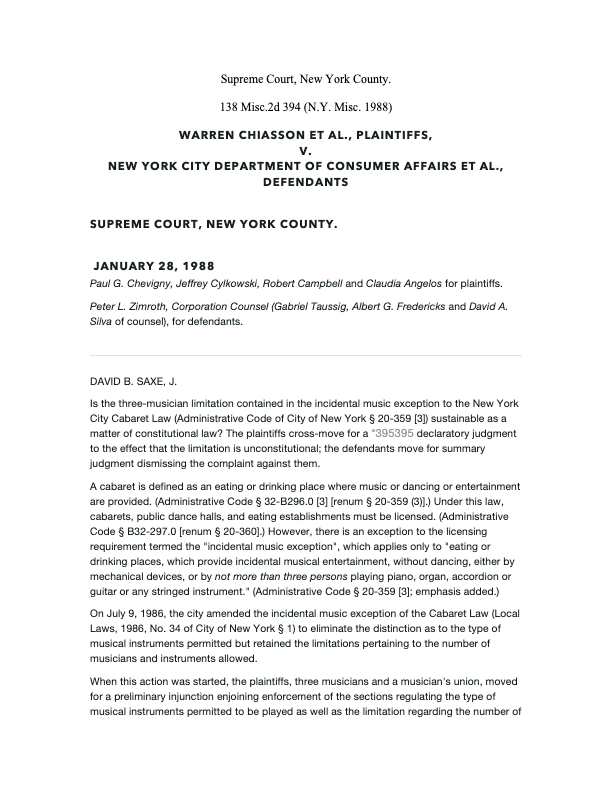At the time of passage of the bill to repeal the Cabaret Law, it was clear that the repeal was only a partial measure as reflected in this article by Derek Evers. Important restrictions remained in the zoning law and other regulations: “Even with a repeal of the Cabaret Law, New York City establishments wishing to host music performances and dancing still must hold the various other permits needed from, for example, the city’s health, buildings and fire departments, as well as the state liquor authority.”
Doc Category: Cabaret Law
Local Law 214 2017 – Repeal of Cabaret Law
In November, 2017, the NYC Cabaret Law was repealed, but no changes were made to dancing restrictions found in the Zoning Resolution which continue to restrict dancing to Use Group 12 Zoning Districts.
Muchmore v. City of New York – Opinion re Motion on the Pleadings
The United States District Court in the Eastern District of New York denied the motion by the City to dismiss the challenge of Muchmore to the Cabaret Law, but required additional briefing on the issues, though granting the City’s motion to dismiss Muchmore’s claim of violation of substantive due process.
Chiasson II
“Summary judgment is granted in favor of the plaintiffs declaring that the
portion of the incidental music exception of the Cabaret Law limiting the number of
musicians who can play at unlicensed establishments to three is unconstitutional.” The license referred to is the Cabaret License.
Festa v. NYC – Appeal Decision
The Festa case was appealed to the Appellate Division, First Department, which upheld the lower court: “Recreational dancing is not a form of expression protected by the federal or state constitution ( see Dallas v Stanglin, 490 US 19; Kent’s Lounge v City of New York, 104 AD2d 397, appeal dismissed65 NY2d 636). Accordingly, the Cabaret Law and attendant zoning regulations challenged by plaintiffs are subject to rational basis review ( Stanglin, supra). The legislative purposes in enacting these provisions were plainly legitimate, i.e., to protect the health, safety and general welfare of the public by limiting, inter alia, noise, congestion and various hazards in residential areas, and to protect the local retail development. It is manifest that the regulations, to the extent challenged by plaintiffs, bear the requisite rational relation to these permissible governmental objectives. We modify only to declare in defendants’ favor ( see Lanza v Wagner, 11 NY2d 317, 334, cert denied 371 US 901). [ See 12 Misc 3d 466 (2006).]”
Local Law 214, 2017, Repealing Cabaret Law
NYC Local Law 214, November 27, 2017. To amend the administrative code of the city of New York, in relation to security cameras and security guards at certain eating or drinking establishments and repealing subchapter 20 of title 20 of such code, relating to licensing public dance halls, cabarets and catering establishments
NYC Department of Buildings Code Notes: Cabarets
Code Notes are published by the New York City Department of Buildings. The Cabaret Code Note was published in March, 2017. As of January, 2020, the Code Notes had not been updated as of January, 2020, over two years after repeal of the Cabaret Law.
December 26, 1926 Cabaret Law As Enacted
Image of Official Publication of 1926 Cabaret Law as Enacted From New York City Archives.
